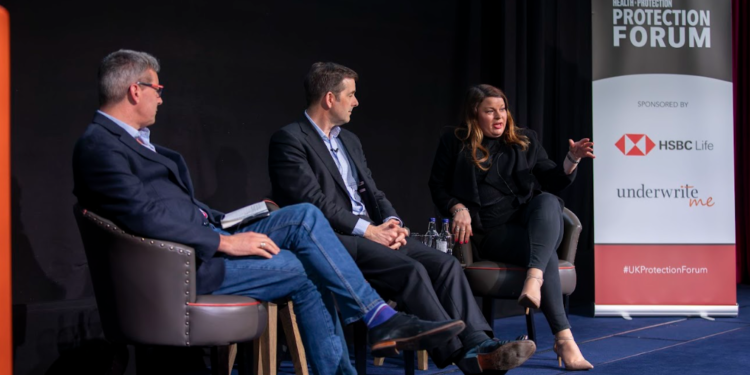Mortgage Advice Bureau (MAB) protection proposition director Andy Walton has laid down the gauntlet for the industry to sell millions more policies in the next five years, not just hundreds of thousands.
Speaking at Health & Protection’s Protection Forum, Walton said the industry was at a crossroads and “needs a massive revolution“.
But to achieve that, one of the biggest issues the industry needs to tackle is the lack of engagement with it despite the introduction of the Consumer Duty, which was highlighted by Emma Thomson, director of Emma Thomson Consultancy Services.
They were joined on the panel by Sam Hudson, executive director of consumer partnerships at Howden Life & Health, who noted consumers were more willing to share the health histories but the industry needed to be more flexible for them.
Revolution
Walton (pictured left) highlighted the need for the protection industry to make big changes and set itself major goals.
“I really think we are at a crossroads here in the history of protection which really hasn’t evolved that much,“ he said.
“We’ve been tweaking at the edges and I think it needs a massive revolution.
“We should be sitting here in five years time not saying we’ve done x number of hundreds of thousands of policies, but x number of millions of additional policies.
“I really think we need to perhaps think out of the box and think transformatively about it.”
Lack of engagement
Thomson (pictured right) said: “For me one of the big pressing issues is the lack of protection engagement despite Consumer Duty.
“You’ve got something that’s vitally important as Consumer Duty that they really should be paying attention to, and it hasn’t made a massive difference.
“How on Earth have we not actually seen a huge increase in protection activity given Consumer Duty, and the cost-of-living crisis?”
The panel also discussed the future of the protection market in a world where technology is becoming more important and the population are becoming more aware of their own health needs.
Greater openness
One positive development cited has been a greater degree of openness from customers.
Hudson (pictured centre) said: “We’ve been through a process of people being worried about asking mental health questions, and now nobody even bats an eyelid pretty much.
“People are even much more open about drug use than they would have been, but that has taken a long time to happen – and my concern is about the pace of change.
“You’ve got to meet a customer where they are, customers generally don’t go look for life insurance or income protection.
“We’re going to have to find more flexible, responsive products pretty quick, because people do understand their financial vulnerability and they want the solution.
“We just need to talk about it in a way they understand.”
Mismatch
Thomson noted that there is often an incongruity between what consumers want and what advisers want to sell.
“If we look at what consumers are actually needing and what they’re actually looking at achieving when it comes to protection – there is sometimes a mismatch between what advisers assume that they’re going to do.
“There is so much out there. We just need to pay attention and make sure that the adviser’s mindset to change and also the products evolve as well.”
Consumer Duty
And another issue is whether the spirit of Consumer Duty is being followed by advisers.
Walton said: “You look at Consumer Duty and it says we should be going on a journey with customers over the life cycle of the product – so we set up a product for 25 years.
“But are we truly going on a journey with the customer?
“I don’t think we are – that is the bit that really needs to change.
“Partly its getting new customers to buy into it, how do we do that? And secondly its for those who have bought into it, staying engaged with them.
“And that comes back to needing flexibility and proper ways of engaging with them.”
Technology
And the answer Walton said may be technology.
“The tech I think will be the bit that takes the heavy lifting off,“ he continued.
“We’ve got two million customers and we would need a vast army of advisers compared to what we’ve got at the minute if we were going to go on this journey.
“So we are looking at how do get the tech to have sensible personal conversations with the customer.”






